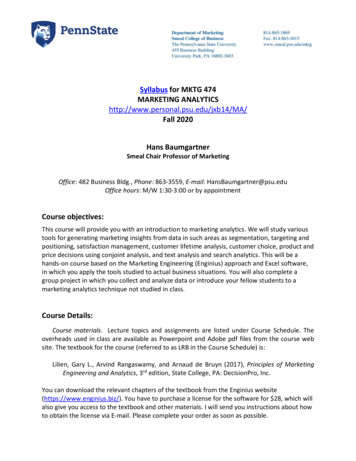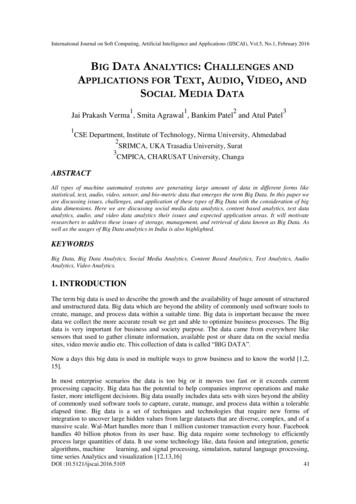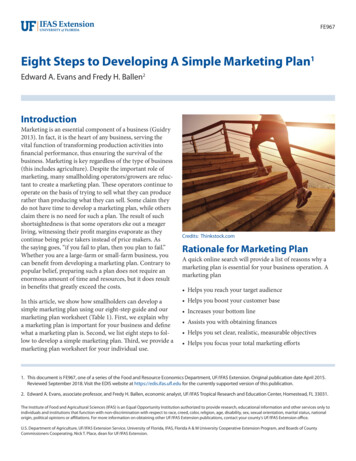
Transcription
Marketing Analyticsfor LeadersApplying the data connection betweenmarketing strategy, decision-making, and results
While many marketing teams invest heavily in analytics, only a few getthe results they expect. Learn the language of data and analytics toimprove how you implement and communicate results-oriented decisions.Marketing Analytics for LeadersMarketing analytics helps collect and strengthen data from across allmarketing channels. This information is key to improving marketingefforts and driving them forward to achieve business goals.Understanding data and analytics-related principles, strategies, andtools will help you reach your own learning goals and contribute moreeffectively to your business.From the fundamentals of marketing analytics to building adata-driven culture within your organization, this course prepares youto take advantage of the exciting possibilities arising from the use ofdata to enhance strategies and achieve better results.Course DetailsTuition: USD 2,500Course Format: Online learning with live, interactive sessionsDuration: Eight weeksLanguage: English and SpanishInstructor: Philippe Geyskens, PhD; Marketing Analytics for Leaders,the University of Chicago
About the CourseOur eight-week course focuses on aspects such as the fundamentals ofmarketing analytics, types of data, modeling and collection, tests andmodels, delving into customer data, data storytelling, building adata-driven culture, and the future of data analytics.After completing this course, you will have the skills and tools toreview and analyze data, and provide strategic recommendations oneverything from positioning, pricing, and target audiences todriving growth.You will learn to: Understand the core principles of data analytics and the connectionwith marketing strategies Leverage data to create strategic competitive advantages Apply data-driven strategies to lead marketing andorganizational initiatives Improve understanding of customers through insights and analysis Communicate and act on results through data storytelling Find, extract, organize, and describe data to support decision-making
Who Should Attend?Designed for marketers, managers, and leaders, this course gives itsparticipants a deeper understanding of how to use data analytics toimprove their organization's marketing strategy. Although previousmarketing experience is advisable, this course is suitable for anyoneinterested in advancing their analytical acumen, regardless ofindustry, job function, or management level. It is also aimed at thosewho would like to pursue or transition into marketing leadershippositions, strategy, or building and supervising marketing teams.Meet Your InstructorAs a data and analytics expert, Philippe Geyskens harnesses bigdata to extract insights that tie marketing spend to businessresult. A digital expert, Geyskens brings over twenty years ofexperience leading analytic teams across quantitative marketingprojects for Fortune 500 companies such as Allstate, GeneralMotors, Sears, and TJ Maxx, ranging from market mixmodeling and multi-channel attribution to CRM analytics.Geyskens holds an MBA from Northwestern University’sKellogg School of Management and a PhD in Civil Engineeringfrom KU Leuven in Belgium. He was also awarded the Belgiangovernment’s Medal for the Performing Arts.Philippe Geyskens, PhD; Marketing Analytics forLeaders, the University of Chicago
Why the University of Chicago?Becoming a member of the University of Chicago community meansgaining access to world-class instructors and a cohort of curious,diverse individuals.Through a firm grounding in core principles and a rigorous approach toproblem-solving, our teaching method—the Chicago Approach—willgive you the tools you need to make sense of complex data and turnideas into impact. Course participants will receive a certificate ofcompletion and join a global network of thought leaders.Approach to Online LearningOur online courses are crafted to support your specific professionaldevelopment goals. Courses combine e-learning with live, interactivesessions to strengthen your skill set while maximizing your time. Wecouple academic theory and business knowledge with practical,real-world application.Through online sessions, you will have an opportunity to interact withUniversity of Chicago instructors and your peers.
Career OutlookThe US Bureau of Labor Statistics projects that overall employmentfor advertising, promotions, and marketing managers will grow atthe above-average rate of 8.1%, creating 26,000 new jobs over thenext eight years. Significant new growth areas include digitalmarketing, multichannel marketing, and e-commerce—positionsthat did not exist in the early 2000s.To succeed, marketing professionals need to immerse themselves inthe digital world. Digital spending continues to increaseexponentially, and technical and analytical skills have become thekey to employability.#914%The ranking of MarketResearch Analyst inUS News and WorldReport’s 2021 BestBusiness JobsThe CAGR of themarketing analyticsmarket over the nextfive years 141kThe median pay foradvertising,promotions, andmarketing managersin the USPotential Job Titles for Marketing Analytics Professionals Account Manager Advertising Manager Business Analyst Business Development Analyst Digital Brand Manager Digital Marketing Analyst Market Research Analyst Marketing Analyst Marketing Data Analyst Marketing Manager Promotions Manager
Weekly ScheduleThe Marketing Analytics for Leaders course covers thefollowing topics:Module 1: Introduction to Marketing Analytics Definition of analytics and its impact on business outcomes Qualitative vs. quantitative data Differentiation of data types and categories Overview of the analytics-based decision-making processModule 2: Understanding Your Customer Positioning marketing as a process to create value (as opposed toselling a product) Steps in the customer value creation process and marketing tactics Understanding the customer decision journeyModule 3: Framing the Problem The importance of framing as the first step to an analytics project Formulating problem-solving hypotheses Identifying stakeholders and their objectives A summary understanding of analytics techniques Problem statements and the SCQ(A) Framework
Module 4: Building Models The concept of independent, dependent, and control variables The difference between data and metrics Recognizing data quality and quantity issuesModule 5: Solving the Problem Core concepts of testing and the difference between analyticsand testing Quantifying relationships between variables and exploring closedloop measurement The importance of A/B testing Knowing how to execute a “clean,” actionable test Regression analysis and what it is good for Understand the difference between causation and correlationModule 6: Integrating Your Findings into the Business—Driving Change Crafting a convincing data story and using the right data chart toconvey information Building informative and relevant dashboards Revisiting the A in the SCQ(A) Framework Pyramiding, persuasive storytelling through presentations, andthe do’s and don’ts of dashboarding
Module 7: Building a Data-Driven Culture The organizational stages of analytical maturity Best practices for creating a data-driven culture Data governance structure How to instill a governance culture in your organizationModule 8: Analytics—The Good, the Bad, and the Ugly Data and ethics: privacy, security, and emerging laws Emerging technology: AI and voice Changes involving people and processesCourse outline may be subject to change based on academic adjustments.Learn moreTo schedule an appointment with admissions, contactadmissions@online.professional.uchicago.edu oralternatively you can let us know when we can call you here.Visit online.professional.uchicago.edu to learn more.
The Marketing Analytics for Leaders course covers the following topics: Module 1: Introduction to Marketing Analytics Definition of analytics and its impact on business outcomes Qualitative vs. quantitative data Differentiation of data types and categories Overview of the analytics-based decision-making process










